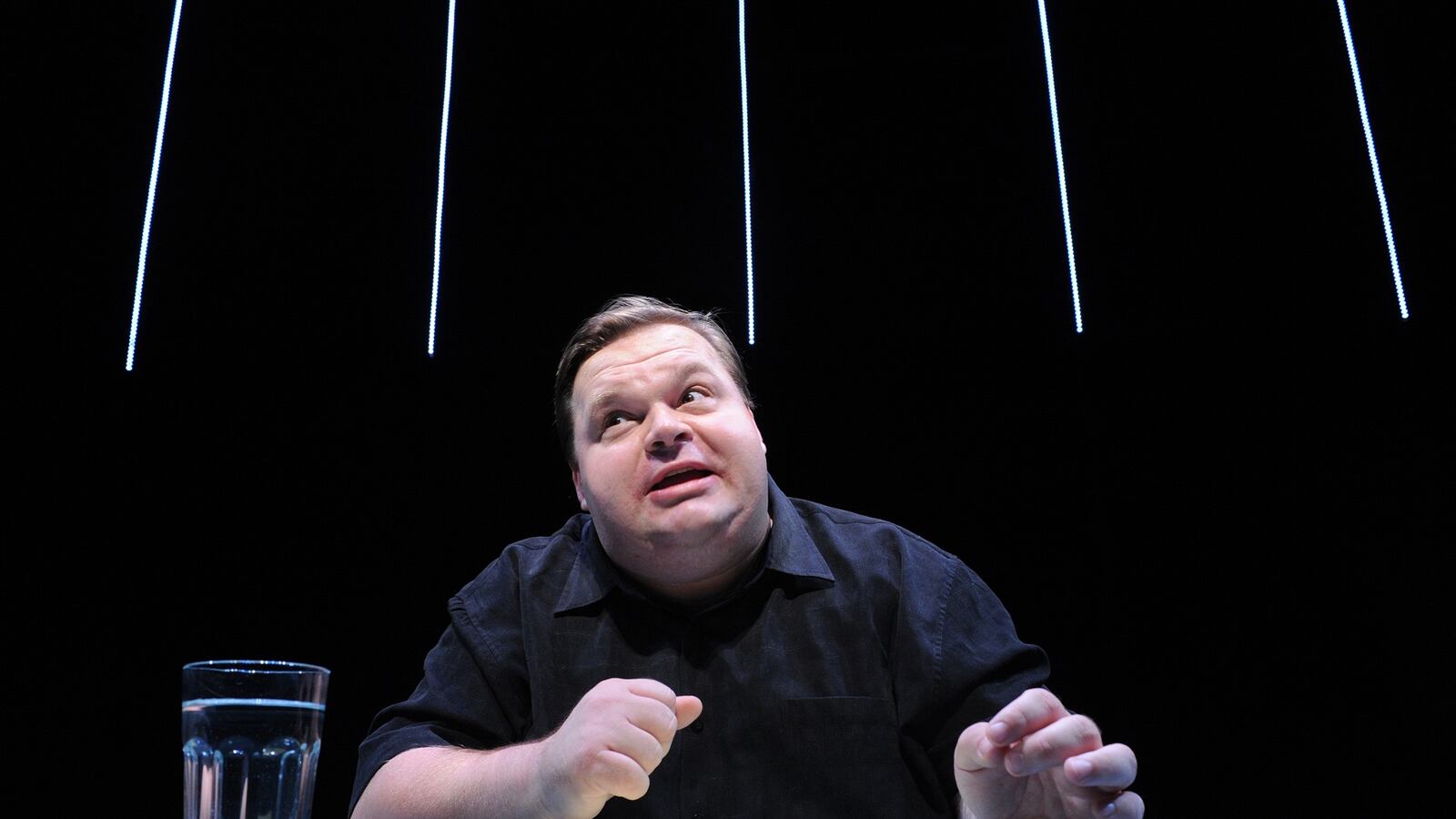Mike Daisey confessed at the outset that he had little idea what he was going to say for the next two hours, in a first-ever monologue titled “Journalism” at the Tiffany Center on Tuesday night in downtown Portland. The question was whether anyone could believe him.

This, after all, was the guy who took on the Cult of Apple and in dramatic monologues across America appeared to expose its shoddy treatment of its underaged and overworked and malformed and poisoned workers, only to find himself the subject of exposure, for the embellishments and outright fabrications he repeated on This American Life, eventually forcing the radio program to issue an unprecedented retraction of an entire show.
On this night, 14 months after Daisey’s became a “scandal-eel,” as he put it, he arrived in the City of Roses to ... explain what really happened? Defend himself? Mock Portland’s fervent fluoridation debate? Ramble about racing the janitor in the eighth grade? About whether he’s an otter or a weasel? Apologize some more?
Yes, yes, yes, yes, yes and no. Daisey was not, he made clear as he sat in all black with a glass of water at a drab brown table in a surprisingly packed house, there to apologize. He’s already done that, again and again. What he was there to accomplish, though, seemed unclear even to Mike Daisey.
“The elaborate fiction,” he said, “is that I have some fucking idea of what’s going to happen,”
The program, the “colophon,” promised a performance that would “never be repeated,” a performance about journalism, “heavily influenced” by the great journo pontificators of the day, from Jay Rosen to Jack Shafer to Jim Romenesko. But at the end of that monologue he is quick to disclaim “that this is a true story, and like every story being told in every medium, all stories are fiction.”
That colophon included. Daisey told his viewers right away that he should have added “I hope” to the playbill, but that he knew if he did that—if he dared let people know he was effectively going to fumble his way from one point to the next without any clear thesis or direction—people might not show up. They might say, “I’m going to pay money to see some fat, confused guy going, ‘I don’t know’?”
Which is pretty much the same thing he told Ira Glass when the radio host confronted him about the many fabrications in Daisey’s infamous monologue, The Agony and Ecstasy of Steve Jobs. He believed if he stuck to the truth, no one would listen to him.
So Daisey overpromised (again.) He spent much of the first 45 minutes describing the three interviews he’d held in the prior week or so with local newspapers before this hastily announced show. One Q&A (“the lowest form of interview journalism,”) from Portland Monthly; a “good” piece from The Oregonian (which referred to Daisey as a “master of monologue”) and a “terrible” one from Willamette Week, much of which is spent arguing with the reporter about what constitutes propaganda. What any of that has to do with journalism or Romenesko or Shafer, Daisey didn’t really say, except to insist that there is no such thing as objectivity in journalism and that this experience with this brow-beating reporter from the Pulitzer Prize–winning alt-weekly proves that.
Other points Daisey made about journalism in that first 45 minutes were based on his own experience, as the subject of it. The articles about him are shorter than they used to be. More lowly Q&As. More interns transcribing those Q&As, leading to errors. All of this describes the state of journalism in decline (as opposed to the state of Mike Daisey in decline).
He also spoke of journalism as a former practitioner—that is, as a precocious eighth grader who started a school newspaper in Maine and made the mistake of calling a janitor “old” instead of just “ol’” and infuriating that janitor and being challenged to a race by the guy, which Daisey lost. What that anecdote said about journalism, he also failed to elaborate. Word choice is a motherfucker, maybe?
Halfway through the set, which he insisted to the staff not be interrupted by people coming and going, Daisey had yet to mention Shafer or Romenesko or Poynter or anything about the problems and solutions facing the modern media, unless they were all hidden in the autobiographical anecdotes. But he did, eventually, drive home a few key points: Mike Daisey loves journalists, or “gremlins.” It’s a calling. He loves journalism. He is sad that it is suffering. He can’t imagine a world without it.
After all, journalists are just like him, aren’t they? He’s a storyteller. They’re storytellers. They sometimes take liberties. He sometimes take liberties. They believe narratives can impact change. He believe narratives can impact change. The only difference between the theater and journalism is that in the theater “the blanket assumption is that everything is a lie” and that journalists “didn’t sign up for this much fucking theater,” that nobody wants to buy their product. In the theater, everyone has known that for a very long time.
Buried in two hours of alternatively funny and somber and consistently profane stream of consciousness, it’s clear Daisey does get journalism and why the institution is now “a baked Alaska caving in on itself,” even if he has come to understand that only by virtue of being so mercilessly skewered by journalists over the past year or so. He has read everything ever written about his scandal, he said, if only to “become larger than it.” And in doing so, he has come to believe that what happened to him is really sort of a reflection of what is happening to journalism. He referenced an interview last month with humorist David Sedaris, who theorized that the reason Daisey got caught up in a scandal is because the death of print journalism leaves the public to come to people like him, to “entertainers,” for the truth. Playing a part in that, Daisey said, he “truly regrets.”
But what Mike Daisey has no intention of doing—whether you call it truth or fiction, journalism or theater, propaganda or narrative—is stopping. Inspired by the news of last month’s factory collapse in Bangladesh, Daisey said he plans to travel there soon, to talk to workers and bring back their stories.
But will you believe him? Does it matter?
“You’ll just have to trust me,” Daisey told the audience at one point. “Or you won’t, really. Right?”





